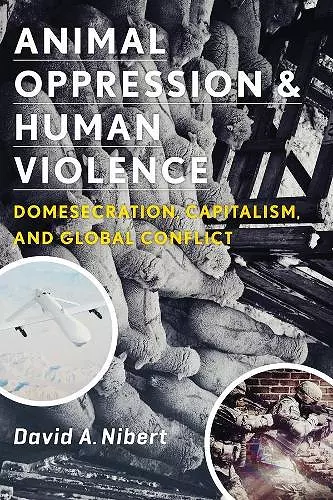Animal Oppression and Human Violence
Domesecration, Capitalism, and Global Conflict
Format:Hardback
Publisher:Columbia University Press
Published:21st May '13
Currently unavailable, and unfortunately no date known when it will be back

This book is poised to fill a very specific gap in the literature and will therefore be of great service to environmental studies. -- John Martin Gillroy, director, Environmental Policy Design Programs, Lehigh University David A. Nibert is one of the most important scholars writing in the field of critical animal studies today. Broad in scope and bold in vision, Animal Oppression and Human Violence is a profound and radical reinterpretation of the process of animal 'domestication.' Challenging orthodox views, Nibert's comparative historical analysis charts the intertwined exploitations of nonhuman animals and humans as mutually-reinforcing relations of power and violence. In his sobering discussion of the global system of 'meat' production, Nibert demonstrates how the exploitation of nonhuman animals is fundamentally connected to the most serious problems facing all of us today. I will be using Animal Oppression and Human Violence as a key text in my sociology classes, yet the book is essential reading for anyone who seeks greater understanding of how our relationships with other animals have shaped the development of human societies. Anyone concerned with social justice issues in general will benefit from reading this important book. -- John Sorenson, Brock University David Nibert opens a whole new dimension to human history, linking animal 'domestication' and consumption to political violence and environmental catastrophe. Historically grounded, deeply researched, clearly written, and richly illustrated, this book offers revelations of the utmost urgency. -- Michael Parenti, author of The Face of Imperialism
By comparing practices of animal exploitation for food and resources in different societies over time, David A. Nibert finds in the domestication of animals, which he renames “domesecration,” a perversion of human ethics, the development of large-scale acts of violence, disastrous patterns of destruction, and epidemics of infectious disease.Jared Diamond and other leading scholars have argued that the domestication of animals for food, labor, and tools of war has advanced the development of human society. But by comparing practices of animal exploitation for food and resources in different societies over time, David A. Nibert reaches a strikingly different conclusion. He finds in the domestication of animals, which he renames "domesecration," a perversion of human ethics, the development of large-scale acts of violence, disastrous patterns of destruction, and growth-curbing epidemics of infectious disease. Nibert centers his study on nomadic pastoralism and the development of commercial ranching, a practice that has been largely controlled by elite groups and expanded with the rise of capitalism. Beginning with the pastoral societies of the Eurasian steppe and continuing through to the exportation of Western, meat-centered eating habits throughout today's world, Nibert connects the domesecration of animals to violence, invasion, extermination, displacement, enslavement, repression, pandemic chronic disease, and hunger. In his view, conquest and subjugation were the results of the need to appropriate land and water to maintain large groups of animals, and the gross amassing of military power has its roots in the economic benefits of the exploitation, exchange, and sale of animals. Deadly zoonotic diseases, Nibert shows, have accompanied violent developments throughout history, laying waste to whole cities, societies, and civilizations. His most powerful insight situates the domesecration of animals as a precondition for the oppression of human populations, particularly indigenous peoples, an injustice impossible to rectify while the material interests of the elite are inextricably linked to the exploitation of animals. Nibert links domesecration to some of the most critical issues facing the world today, including the depletion of fresh water, topsoil, and oil reserves; global warming; and world hunger, and he reviews the U.S. government's military response to the inevitable crises of an overheated, hungry, resource-depleted world. Most animal-advocacy campaigns reinforce current oppressive practices, Nibert argues. Instead, he suggests reforms that challenge the legitimacy of both domesecration and capitalism.
... A book with great cross-disciplinary appeal. Highly recommended. CHOICE An impressive and extensive historical analysis of key intersections between the exploitation of animals and the oppression of human beings. The Year's Work in Critical and Cultural Theory A profoundly important book and should be widely read and discussed. AAG Review of Books One of the great virtues of Animal Oppression and Human Violence is that it holds the potential for providing the expanding but vastly interdisciplinary field of Animal Studies with a unifying theory, and is therefore a highly significant contribution to this field. -- Brian M. Lowe Society & Animals
ISBN: 9780231151887
Dimensions: unknown
Weight: unknown
352 pages